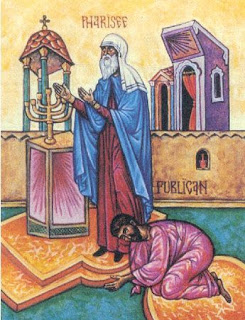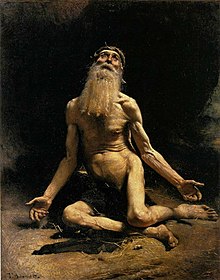'Jesus told this parable to some who trusted in themselves that they were righteous and regarded others with contempt: "Two men went up to the temple to pray, one a Pharisee and the other a tax collector. The Pharisee, standing by himself, was praying thus, `God, I thank you that I am not like other people: thieves, rogues, adulterers, or even like this tax collector. I fast twice a week; I give a tenth of all my income.' But the tax collector, standing far off, would not even look up to heaven, but was beating his breast and saying, `God, be merciful to me, a sinner!' I tell you, this man went down to his home justified rather than the other; for all who exalt themselves will be humbled, but all who humble themselves will be exalted."'
--Luke 18: 9-14
What was the first prayer that you learned? For me it was a bedtime prayer that hung on my wall: “Now I lay me down to sleep/I pray the Lord my soul to keep/If I should die before I wake/ I pray the Lord my soul to take. Amen.” There is a lot I could say about how theologically sound or appropriate that prayer actually is for a child, but I’m grateful my parents taught it to me because it helped me over the years develop a practice of prayer before bed. Even if it is just a “Thank you, Lord, for this day,” I try to manage some sort of acknowledgment of God, and very often that super short prayer has been the only one I can muster the entire day.
It is said that all prayer, when you get down to it, falls into one of four categories, four types of prayer: Adoration, Confession, Thanksgiving, and Supplication – or as Anne Lamont put it: Wow, Sorry, Thanks, and Help. Adoration are the prayers of praise to God and acknowledgment of who God is, and who we are not. Confession is when we acknowledge our faults and ask both God’s forgivingness and that of others. Thanksgiving is simply saying thanks to God for all God has done. Supplications are offered for particular people and situations, maybe for a loved one who is sick or a crisis going on in the world for which we cry out to God to intercede. I would say, “Now I lay me down to sleep” falls into the category of supplication.
I’ve noticed that sometimes folks get the notion that praying is reserved for a certain type of Christian with a special aptitude for it, like the ordained. I get that a lot if I’m having dinner with someone who glances at me when it’s time for grace and says something like, “You’ve got the direct line to God.” Blessedly, while I was away on my medical leave our the Vestry of my parish adopted the practice of having one of their own say the opening prayer before the monthly meetings. I really like this, and I’m glad that it’s something we have continued to do since my return. It’s a good reminder that prayer is something we all can do, something we all must do, not just the clergy.
Prayer, as it turns out, is a prominent theme throughout the Gospel of Luke, which we’ve been reading all year. From the adoration prayers announcing Jesus’ birth in chapter 1, to the supplication of Jesus on behalf of his murderers in chapter 23, the life and ministry of Jesus in this Gospel are distinguished by prayer. The parable that Jesus offers to his followers in today’s reading is a lesson on prayer.
An icon depicting the parable of the pharisee and tax collector/publican
Two men go up to the Temple to pray, one a Pharisee and the other a tax collector. We are already conditioned to understand the contrast between these two people – the self-righteous, elitist Pharisee and the greedy, despised tax collector. The Pharisee, the text says, stands and prays by himself, suggesting a kind of aloofness. A better translation of the Greek phos heauton is that he prayed “within himself,” something of a narcissistic silique. While the tax collector makes his plea very loudly down on his knees.
Now to be sure, the Pharisee does pray one of those four types of prayer. It’s a thanksgiving to God and was actually a fairly common one among Pharisees at the time. He thanks God that he is not a sinner, like other people, especially this tax collector. Meanwhile, the tax collector puts himself in a posture of contrition and remorse, his is a prayer of confession and supplication. Which of these two characters gets the approval of Jesus? Of course it is the tax collector, who, though part of a notoriously greedy and sinful lot, humbles himself before God and his fellow worshippers in the Temple.
"Those who exalt themselves will be humbled, and those who humble those themselves will be exalted." We are all too familiar with these words of Jesus, yet I wonder how often each of us hears this story and asks which one am I? Jesus’ audience was literally filled with Pharisees and tax collectors , but because I am going to guess that none of you dear readers is either a Pharisee or tax collector, I think our challenge with this text is to find ourselves in it.
We might be quick to vilify the Pharisee; after all, they are so often painted as the bad guys in the story. Yet, as the German theologian Karl Barth once said, both men are equally shamed before God: the Pharisee for his self-righteousness and the tax collector for his greed. The difference, Barth points out, is that the Pharisee doesn’t recognize his sin and the tax collector does, which is why Jesus commends him, despite his sin. The Pharisee is quick to point out the speck in his neighbor’s eye but not the log in his own, to borrow from another parable of Jesus from Matthew, chapter 7. And so, are we able to recognize our own sin, or are we too busy pointing out the sins of our neighbors? It takes a lot of vulnerability to the former.
This, I believe, is the great lesson of this parable for both Jesus’ audience then and for our own time. Last week I was making a pastoral visit in the home of a parishioner, and I noticed that the tv remained on throughout our visit, and I couldn't help but notice that every single commercial was a political ad. I paid no attention to the party or even the name of the candidates, just the tone of the ads, and even though the volume was off, I could tell simply in the formatting, the colors and saturation on the screen, the text that flashed, and the images of the candidate and the opponent that these were all attack ads, sending the message, “The candidate who approved this message is not like this other person.” It was the parable of the Pharisee and tax collector playing out in real life, and it made me very glad that I don’t have cable television in my home.
The higher we lift ourselves up, the farther we will fall. To be humble, as Jesus teaches in this parable, is to have the vulnerability to recognize our own sin. The Pharisee was too busy focusing his prayers on thanking God for all the good stuff going on for him that he couldn’t see what he was doing. We develop eyes to truly see and hearts that are humble when we cultivate a full prayer life that incorporates not just thanksgivings but adoration of God, prayers of supplication for others, and confession for our mistakes, what we have done and left undone. Such a full prayer life is something we practice each Sunday in our liturgy together, but as a colleague of mine always likes to say, “Sunday is the dress rehearsal for the rest of our lives.” Every day brings with it the invitation to practice such a life, even if the prayers we make are super short.
If I ask myself who I am in this parable, the truth is I have probably been more like the Pharisee than I’d care to admit, too focused on saying thanks for all the good in my life to notice my own self-righteousness. But knowing that, what can I do about it? How can my prayer life be changed, so that I can be changed? I do not believe prayer changes things, but I believe it changes us, it changes the one praying. With a full prayer life that balances Adoration, Confession, Thanksgiving, and Supplication we can meet and live up to the great challenge of the Gospel of Jesus Christ, which is that all people are beloved – the Pharisee, the tax collector, you, me, them, everyone - and that it is within our power to create Beloved Community (what Jesus called the Kingdom of Heaven) wherever we are. We don’t need to humble ourselves to the point of beating ourselves up, nor should we be so thankful as to exalt ourselves to the point of acting as if God should be thanking us for coming to church on a Sunday. It’s a balancing act. How might we humble and exalt ourselves and others in appropriate – that is, balanced – ways?
In this world of ours right now it seems like everyone just wants to exalt themselves and throw shade at their neighbors the way the Pharisee in the parable does. It’s impossible to ignore because that message plays out everywhere we look. May we who follow the Way of Jesus take the higher road, which, ironically, involves getting on our knees and, like a humble, vulnerable child, simply praying: Wow, Sorry, Thanks, and Help
















